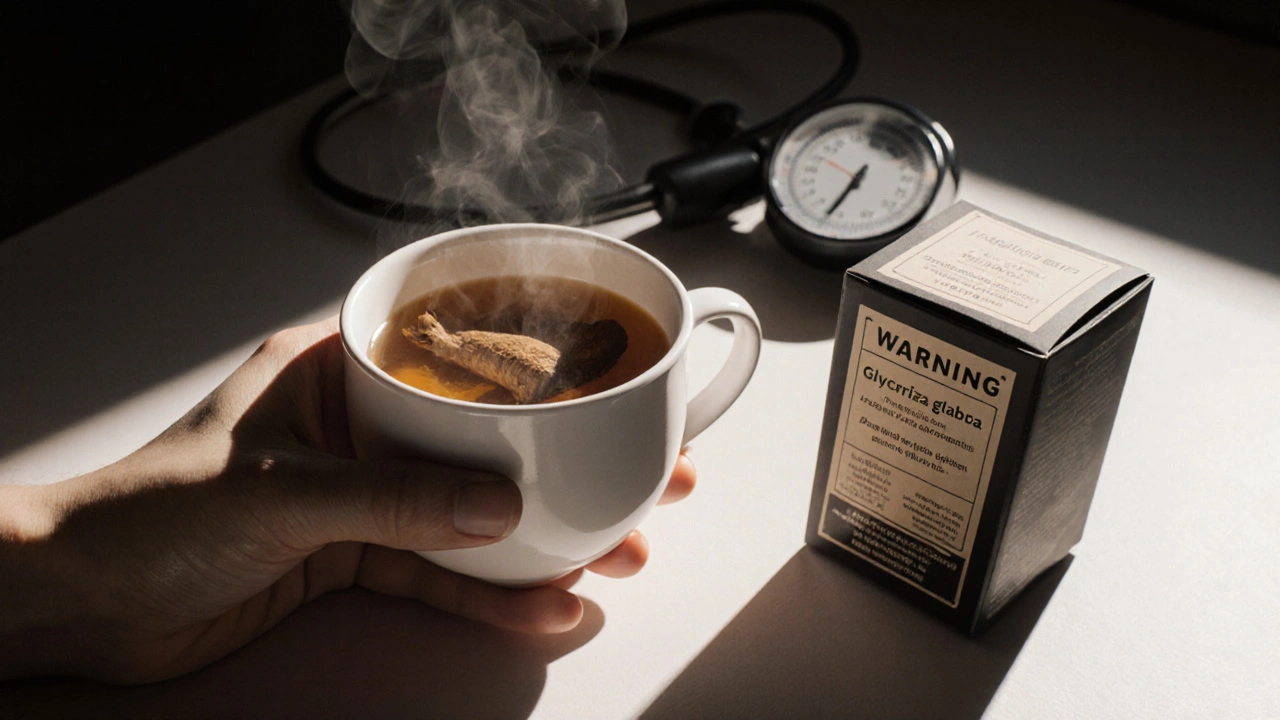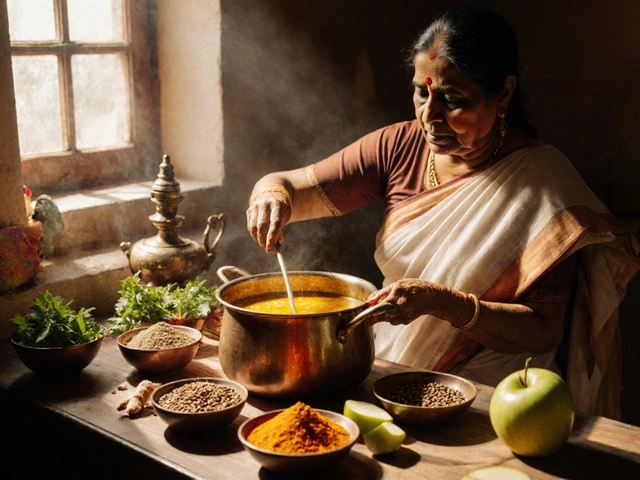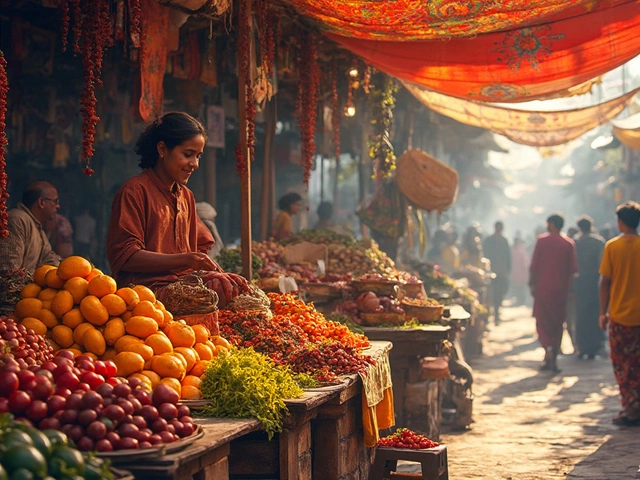If you're managing high blood pressure, you might think herbal remedies are always safe. But some common herbs can actually push your blood pressure higher - sometimes dangerously so. This isn’t about rare supplements. These are herbs you might be taking for energy, digestion, or stress relief without realizing they’re working against your health.
Black Licorice Root
Black licorice isn’t just a candy flavor. The root contains glycyrrhizin, a compound that tricks your body into holding onto sodium and flushing out potassium. That imbalance causes fluid retention and spikes in blood pressure. One study from the Journal of Human Hypertension found that people who consumed just 100 mg of glycyrrhizin daily - about 50 grams of licorice candy - saw their systolic pressure rise by 15 mmHg within two weeks. Even herbal teas labeled as "digestive aid" or "natural remedy" can contain licorice root. Always check the ingredients. If you see "Glycyrrhiza glabra," put it down.
St. John’s Wort
Many people turn to St. John’s Wort for mild depression or anxiety. But it doesn’t just affect your mood. This herb strongly interferes with how your body processes medications - including those for blood pressure. It activates enzymes in your liver that break down drugs like beta-blockers and calcium channel blockers faster than normal. That means your medication doesn’t work as long or as well. The result? Your blood pressure climbs because the treatment is being flushed out of your system too quickly. A 2023 review in Pharmacotherapy showed that 37% of patients on antihypertensive meds who added St. John’s Wort saw a significant rise in their readings within 10 days.
Ephedra (Ma Huang)
Ephedra is banned in the U.S. and the UK for safety reasons, but it still shows up in some online herbal weight-loss blends and traditional formulas. It contains ephedrine, a stimulant that tightens blood vessels and speeds up your heart. That’s why it was once used in diet pills - and why it caused thousands of emergency room visits before being pulled. Even small doses can raise systolic pressure by 20 mmHg or more. If you’re buying herbal products from unregulated sources, especially from overseas websites, ephedra might be hiding in plain sight. Don’t risk it. There are no safe doses for anyone with high blood pressure.
Ginseng (Panax ginseng)
Ginseng is popular for energy and focus, especially among older adults. But it’s not a gentle herb. Panax ginseng can stimulate the nervous system and constrict blood vessels, leading to elevated blood pressure. A 2022 clinical trial in South Korea tracked 120 participants with borderline hypertension. Half took 2 grams of ginseng daily for eight weeks. The group taking ginseng saw an average increase of 12 mmHg in systolic pressure. Not everyone reacts the same - some people see no change - but if your pressure is already high, it’s not worth the gamble. Asian ginseng is the main culprit; American ginseng (Panax quinquefolius) is less likely to raise pressure, but even that isn’t guaranteed.
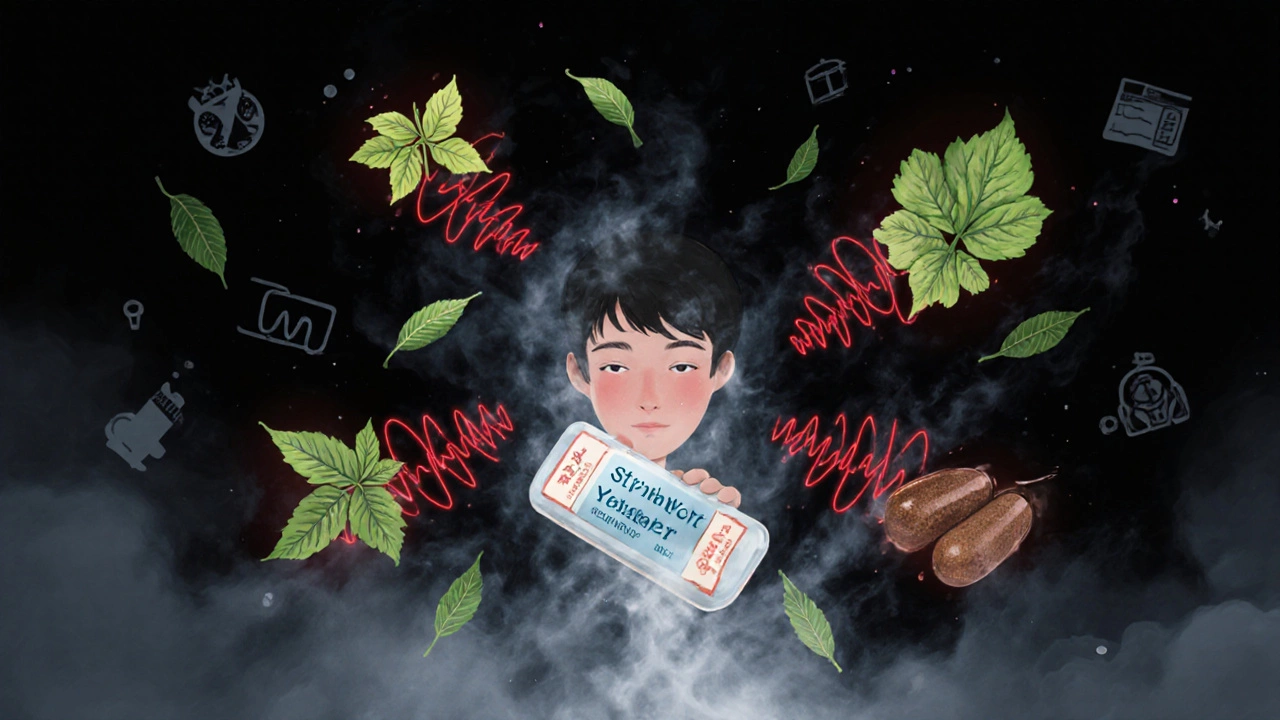
Yohimbe
Yohimbe bark is often marketed as a natural libido booster or fat burner. Its active ingredient, yohimbine, acts as an alpha-2 adrenergic blocker, which triggers adrenaline release. That spike in adrenaline raises heart rate and constricts arteries. In a small 2021 study published in Clinical Hypertension, men with controlled hypertension who took 10 mg of yohimbine daily saw their average blood pressure jump from 132/84 to 151/91 within three weeks. Even one capsule can cause a noticeable spike. If you’re using supplements for sexual performance or weight loss and your blood pressure suddenly feels higher, yohimbe could be why.
Guarana
Guarana is a South American plant with seeds that contain nearly twice the caffeine of coffee beans. It’s added to energy drinks, weight-loss pills, and even some "natural" pain relievers. Caffeine is a known short-term blood pressure raiser - it can spike systolic pressure by 10-15 mmHg for up to three hours after ingestion. If you’re drinking guarana-based energy drinks or taking supplements with it multiple times a day, you’re keeping your pressure elevated for hours on end. People with hypertension are more sensitive to caffeine’s effects. One cup of coffee might be fine. Two cups of guarana extract? Not so much.
Arnica
Arnica is usually applied topically for bruises and muscle pain. But some people take it orally as a homeopathic remedy or in herbal teas, believing it reduces inflammation. Oral arnica contains helenalin, a compound that can interfere with blood clotting and cause blood pressure to rise. While rare, cases have been reported where people taking arnica pills developed sudden hypertension and heart palpitations. The UK’s Medicines and Healthcare products Regulatory Agency (MHRA) warns against internal use of arnica. Even if you’re not taking it for blood pressure, don’t assume it’s harmless. Stick to topical gels only - and never swallow it.
What to Do Instead
If you’re using herbs for energy, stress, or sleep, there are safer alternatives. For energy, try ashwagandha - it doesn’t raise blood pressure and may even help lower it slightly. For stress, lemon balm and chamomile are gentle and well-studied. For sleep, magnesium glycinate and valerian root are effective without affecting blood pressure. Always talk to your doctor before starting any new herb, even if it’s "natural."
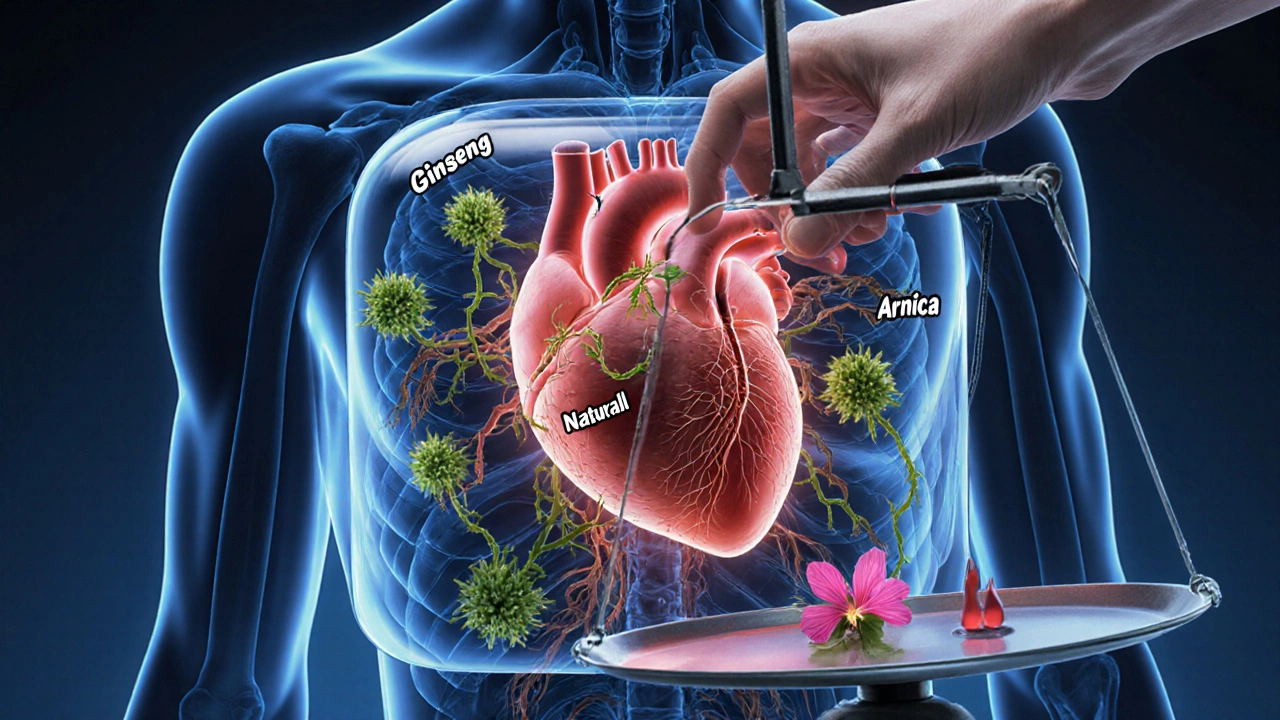
How to Check Your Supplements
Many herbal products don’t list all ingredients clearly. Look for these red flags:
- "Natural energy blend" or "proprietary formula" - this hides what’s inside
- Ingredients listed in Latin names (like Glycyrrhiza glabra for licorice)
- Products sold online without a manufacturer address or batch number
- Claims like "instant results" or "miracle cure"
Use the NHS’s Medicines and Healthcare products Regulatory Agency (MHRA) database to check if a supplement is licensed. If it’s not listed, it hasn’t been tested for safety.
When to See a Doctor
See your GP immediately if you notice:
- Sudden headaches, dizziness, or blurred vision after starting a new herb
- Your home blood pressure monitor shows readings consistently above 140/90
- You feel your heart racing or pounding without physical exertion
These aren’t normal side effects. They’re warning signs your body is reacting badly to something you’re taking.
Final Reminder
"Natural" doesn’t mean safe. Many of the most dangerous substances on earth come from plants - hemlock, belladonna, digitalis. Herbs are powerful. They interact with your body, your medications, and your blood pressure in ways you can’t predict. If you have high blood pressure, assume any new herb could raise it until proven otherwise. Always check with your doctor. Your heart won’t thank you for guessing.
Can I still drink green tea if I have high blood pressure?
Yes, but limit it to one or two cups a day. Green tea contains caffeine and catechins, which can mildly raise blood pressure in sensitive people. However, studies show that moderate green tea consumption (under 500 mg of catechins daily) may actually help lower blood pressure over time due to its antioxidant effects. Avoid matcha or concentrated green tea extracts - those are much stronger and riskier.
Do turmeric or ginger raise blood pressure?
No, neither turmeric nor ginger raises blood pressure. In fact, both have mild blood-pressure-lowering effects. Turmeric’s curcumin helps relax blood vessels, and ginger improves circulation. You can safely use them in cooking or as supplements, as long as you’re not taking blood thinners like warfarin - both herbs can interact with those medications.
Is licorice tea safe for high blood pressure?
No, licorice tea is not safe if you have high blood pressure. Even herbal teas labeled as "licorice root" contain glycyrrhizin, which raises blood pressure. Look for "deglycyrrhizinated licorice" (DGL) if you want the digestive benefits without the risk. But even then, talk to your doctor first. Most licorice teas aren’t DGL.
Can I take herbal supplements if I’m on blood pressure medication?
Only if your doctor approves them. Many herbs - like St. John’s Wort, ginseng, and yohimbe - interfere with how your body breaks down blood pressure drugs. This can make your medication less effective or cause dangerous spikes. Never start a new herb without telling your GP or pharmacist. Keep a list of everything you take, including teas and supplements.
Are there any herbs that are safe and help lower blood pressure?
Yes. Hibiscus tea has been shown in multiple studies to lower systolic pressure by 7-13 mmHg. Garlic supplements (aged garlic extract) also help, with studies showing a 7-10 mmHg reduction over 12 weeks. Hawthorn berry and beetroot powder are other options with solid evidence. But even these should be used under medical supervision, especially if you’re already on medication.
Next Steps
If you’re currently taking any herbal supplements, stop them for now and make an appointment with your GP. Bring the bottles with you - even if they look harmless. Your doctor can check the ingredients against your medication list. If you don’t have a GP, visit your local pharmacy. Pharmacists are trained to spot dangerous herb-drug interactions. Don’t wait for symptoms to get worse. High blood pressure doesn’t always cause warning signs - but the damage it does to your heart and arteries does.
